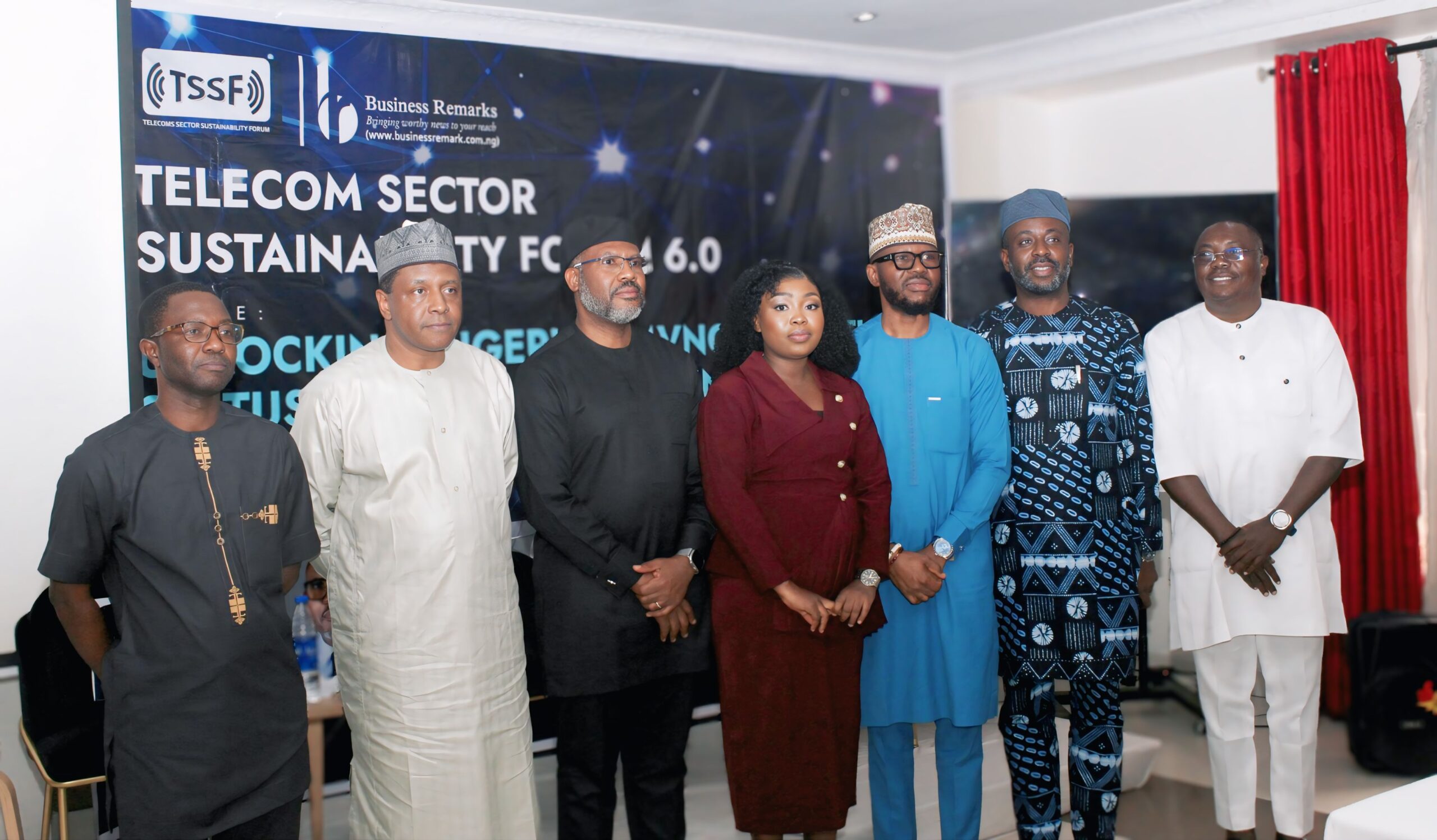Telecom
Samsung Unveils Galaxy A14 – A Phone for All Occasions

Samsung has announced the new Galaxy A14 with the latest innovation and technology that has become synonymous with Galaxy smartphones.

L-R: Nathan Lee, Business Manager; Joy Tim-Ayoola, Head of MX Division; Charles Lee, Managing Director, Samsung Nigeria; Chika Nnadozie, Head Marketing PR, Samsung Nigeria; and Stephen Okwara, Product Manager, MX Division, during the launch of Galaxy A14 on Tuesday, March 7 2023 in Lagos.
This latest Galaxy A series comes with a large screen, an awesome camera and all the essentials you need to stay connected.
It looks and feels awesome as it delivers a truly special performance from its connectivity and design to give its users an overall amazing mobile experience at a great value.
The Galaxy A14 features the tried and tested Galaxy signature design identity with a refined and polished camera deck.
The flat, linear camera housing seamlessly blends into the uni-body frame to complete the visually appealing silhouette. With a laser pattern back cover, the phone comes in beautiful colours that include light green, black and silver1.
Awesome screen
The Galaxy A14 boasts an enhanced, wider and sharper display with a 6.6” FHD+ large display2, high resolution for immersive viewing. This is an improvement on the Galaxy A13 that it replaces, which had a 6.5” HD+ display.
Awesome camera
Each picture is captured with all its incredible details by the awesome triple-lens camera supported by the upgraded selfie camera3. The 50MP main camera ensures that every detail comes alive in high resolution and you can snap the best of yourself with the 13MP selfie camera.
Get a wider perspective and amazing details using the 2MP Ultra Wide Camera or capture the tiniest details, up-close and crisp with the 2MP Macro Camera.
Large storage
Enjoy the room to store more of everything you love with 4GB of memory and 64GB or 128GB storage. You can run more apps and save more of your favourite things with the Galaxy A14’s large and expandable virtual memory and storage. Save more photos, videos, music and documents, and get up to 1TB of extra storage by simply sliding in a microSD card4.
Longer-lasting battery life
In life, once a moment has passed, it will never happen again – the Galaxy A14’s battery works tirelessly so you can savour all those priceless moments. You can certainly get more out of life with its 5000mAh capacity longer-lasting battery5.

Be it shooting high-quality videos of the fun times or taking clear detailed pictures of yourself, your friends or family, enjoying your music playlists, streaming your favourite movies or shows, the Galaxy A14 lets you focus on doing just that and worry less about running out of battery power, which runs strong for two days on a single charge.
Privacy & Security
Enjoy peace of mind in knowing that your device is safe and your privacy is protected with the updates to the operating system and security features.
Samsung provides 2 OS updates and Security Maintenance Release to maximise your experience with the latest features and the highest level of security.
Eco-friendly
Sustainability remains top of mind as Samsung’s eco-conscious technology and innovation continue to get built into the latest products.
The Galaxy A14 was developed with environmentally friendly materials including recycled plastic, which was used for the device’s various components. Furthermore, its accessories were made with bio-based TPU.
A minimalist approach was applied to the product packaging, which was made using recycled paper to also reduce CO2 emission during delivery.
Flex Pay and Screen Repair
With Samsung Flex Pay, you can pay as low as N7000 monthly to own a Samsung A14 Device and Pay Small small over 3-12 months Instalments, the screen repair is as low as N16,000
Availability and RRP
Starting in March, 2023, the Galaxy A14 will be widely available in carriers and retailers, in either 64GB or 128GB storage options at a recommended retail price of N116,900 and N126,900 respectively.
Telecom
Airtel Africa Extends $100M Share Buyback Plan

Airtel Africa has extended its $100 million share buyback programme, first launched in December 2024, in partnership with Barclays Capital Securities Limited. The scheme, aimed at improving shareholder returns, has so far returned $34.7 million through the repurchase of 14.2 million shares, with $20.3 million still to be acquired.

The initiative, now running until March 2026, follows the completion of an initial $50 million phase in April 2025 and currently includes a $55 million tranche.
The telecommunications group, listed on the Nigerian Exchange (NGX), is operating within regulations that restrict share buybacks to 15 percent of issued shares over two years. All repurchased shares will be cancelled, reducing the company’s share capital and potentially increasing earnings per share (EPS).
The buyback follows a strong performance in the first quarter of 2025, when Airtel Africa reported a 16-fold increase in EPS to 3.4 cents, supported by higher operating profits and lower foreign exchange losses. The company also raised capital expenditure by 27 percent, investing $737 million in 2024 to expand infrastructure and secure spectrum across its markets.
The extension of the scheme, according to Airtel Africa, also reflects its intention to provide consistent shareholder value while maintaining investment in its network. The partnership with Barclays ensures compliance with regulations during closed trading periods and seeks to limit market disruption.
Airtel Africa has in recent years considered a separate listing of its mobile money business but postponed the initial public offering in 2025, choosing instead to direct capital into shareholder-focused measures such as the buyback.
Industry observers point out that buybacks may improve financial ratios by reducing outstanding shares, but they can also indicate fewer reinvestment options. Airtel Africa has argued that its programme complements long-term growth priorities, pointing to a 29.5 percent increase in mobile money revenue and a 24 percent rise in its customer base.
The company continues to weigh shareholder rewards alongside reinvestment, citing foreign exchange volatility and other economic pressures in its largest market, Nigeria.
Telecom
Stakeholders Chart Strategic Path for MVNOs in Nigeria

A decisive call for collaboration, strategic market positioning, and patient capital has been issued by key players in Nigeria’s telecommunications sector to unlock the dormant potential of Mobile Virtual Network Operators (MVNOs).

The resolution emerged from the sixth edition of the Telecoms Sector Sustainability Forum (TSSF) organised by Business Remarks at Ikeja, Lagos State, where stakeholders convened under the theme: Unlocking Nigeria’s MVNO Potential: Status, Trends, Investment, and Future Prospects.
The forum, which brought together major mobile network operators (MNOs), the Nigerian Communications Commission (NCC), and licensed MVNOs, served as a candid platform to diagnose the critical challenges stifling the growth of the MVNO sub-sector. The forum stressed that the sustainability of MVNOs in Nigeria is a collective responsibility. It called for unwavering collaboration between MNOs, the NCC, and the MVNOs to replicate the success stories seen in other nations, ultimately fostering a more diverse, competitive, and inclusive telecommunications market for all Nigerians.
In his keynote address, the Executive Vice Chairman of the Nigerian Communication Commission, NCC, Dr. Aminu Maida said the entrance of MVNOs is expected to provide competitive niche offerings as well as enhance digital communications ecosystem in Nigeria for the benefit of the subscribers and the Nigerian economy.
Ably represented by the Director of Licensing and Authorisation, Mr Usman Mamman, NCC noted that there are now over 1000 MVNOs globally, with more than 500 operating in Europe alone and 46 MVNO Licenses were issued in Nigeria by the regulator in the year 2023.
Addressing stakeholders, Maida stated that the Commission is not oblivion to the challenges faced by MVNOs in Nigeria, particularly in relation to commercial negotiations. He therefore pledged that NCC is working assiduously with Mobile Network Operators (MNOs) to improve network capacity.
Furthermore, NCC’s EVC encouraged MNOs to partner with MVNOs to target new verticals, drive margin growth as well as to monetize spare capacity, while urging MVNOs players to recognise the viability of the Nigerian market, invest boldly, and position themselves to reap the long-term benefits of their investments.
In his speech, the President of the Association of Telecommunications Companies of Nigeria (ATCON), Mr Tony Izuagbe Emoekpere, dissuaded MVNO Licensees from blindly adopting foreign MVNOs model for Nigerian local market and consumers. He urged players to conduct diligent market analysis and focus on service differentiation through specialized offerings. “MVNOs need to carve a unique niche specially designed for the Nigerian market,” Emoekpere said.
Speaking on this, the co-founder and executive director, Infratel Africa, Dr Tola Yusuf, stressed that MVNOs in Nigeria’s market must adopt a more strategic approach to succeed in rural and underserved areas. Categorically noting that there are immense potential in connecting these rural communities, Yusuf argued that MVNOs often focus on urban, high-density areas like Lagos, neglecting the vast majority of the population, estimated at over 25 million people who remain completely unconnected.
“The true winners in the MVNO space will be those who develop a clear strategy to serve these markets, even if it requires significant logistical effort, such as using horses or boats to reach remote communities,” he said. He also suggested that the current market might see future mergers and acquisitions, with some license holders potentially selling their licenses as they fail to compete effectively.
Citing examples of banks with MVNOs licenses in other climes, NCC’s Director of Licensing and Authorisation, Mr Usman Mamman during the panel session draws attention to how financial institutions have successfully entered the telecom space by understanding its customers’ needs and tailoring holistic lifestyle services accordingly.
While addressing the need to focus on providing niche services to specific customer groups, Mamman noted that unlike large mobile network operators, MVNOs are expected to be digital-first and flexible, which enables them to be innovative and quickly capitalize on underserved market segments.
On his part, the Director USK Mobile, Dr Chidi Ajuzie, called attention to the capacity constraints by the host MNOs and the revenue- sharing model that can limit profitability. Ajuzie
According to him, “Tier 5 MVNOs are expected to build their own core infrastructure and billing systems (BSS/OSS), but they still rely on the MNO’s radio access network. This creates a bottleneck. Even if a Tier 5 MVNO has excellent billing systems, it can’t offer unlimited data or guaranteed high speeds if the MNO’s network is already at capacity,” he stated.
Ajuzie, however, said some higher-tier are now looking for innovative ways to go beyond the constraint by securing acquiring additional licenses, such as Internet Service Provider (ISP) or Public Licence (PL) licenses.
He also emphasized the
need for a significant expansion of the existing infrastructure, particularly by MVNOs who are now integrating their own fixed infrastructure, such as fiber networks. This expansion, he says, is the only way to “expand the pipe” and create a truly competitive and viable market for all players.
Also speaking ipNX Director of Startegic Business Initiative, Mr Olusola Teniola argued that the nation’s 40,000 telecom towers are grossly insufficient for a population of over 200 million, especially when compared to the United Kingdom’s 75,000 towers for a much smaller population. He stated that unlike developed nations where public funds initially built a robust telecom backbone, Nigeria’s infrastructure was financed by a few dominant mobile network operators (MNOs) who have invested billions.
Teniola posited that the lack of widespread infrastructure, particularly outside major cities like Lagos, Abuja, and Port Harcourt, presents a major challenge for new MVNOs, which were intended to serve the millions of unconnected Nigerians, particularly in rural areas. He also warned that without substantial new investment to expand the network, the MVNO business model will struggle to succeed, with only those that can survive a long-term, 7-to-10-year investment cycle likely to see a return on their capital.
In her welcome address, the Convener who also doubles as the Managing Editor of Business Remarks, Bukola Olanrewaju, said the Nigerian telecom market is growing at an incredible pace and the level of success recorded in each country with MVNOs is largely dependent on the regulatory enforcement and interventions, wholesale agreement, spectrum access, and on how effectively MVNOs players can navigate these hurdles.
“To succeed, Nigeria must collectively build an ecosystem that is both competitive and sustainable,” Olanrewaju remarked as she brought into focus MVNOs operations in South Africa, Thailand and Argentina.
The forum, TSSF 6.0, stressed that the sustainability of MVNOs in Nigeria is a collective responsibility. It called for unwavering collaboration between MNOs, the NCC, and the MVNOs themselves to replicate the success stories seen in other nations, ultimately fostering a more diverse, competitive, and inclusive telecommunications market for all Nigerians.
Telecom
Airtel AI Blocks 84 Percent of Spam SMS in Nigeria

Nigeria has recorded an 84 Percent decline in spam SMS after Airtel Africa deployed its Artificial Intelligence-powered spam detection tool, Spam Alert.

According to Airtel, the free service has flagged over 205 million fraudulent and unsolicited messages across 13 African markets within six months.
Nigeria registered the sharpest decline, while Kenya recorded the highest flagged spam volume with 68 million messages, followed by Tanzania with 47 million and Zambia with 33 million.
Spam Alert prefixes suspicious SMS with “SPAM Alert,” providing users with real-time protection against phishing scams and nuisance texts without requiring extra applications.
Sunil Taldar, CEO, Airtel Africa, said the solution demonstrates the company’s commitment to tackling digital fraud as smartphone penetration expands across Africa.
Currently active in 13 of Airtel’s 14 markets, including Nigeria, Uganda, Zambia, and Tanzania, the service has cut overall spam SMS by 12% across the continent. Seychelles will join soon, Airtel confirmed.
In Nigeria, Airtel reported that between March 13 and May 20, 2025, the system intercepted more than 9.6 million suspicious messages, of which over 9.1 million originated from off-network sources. T
he AI-powered system scans all SMS in real-time using 250 parameters, including sender identity, link structure, and regional anomalies, processing each message in under two milliseconds without storing content.
The Nigerian Communications Commission (NCC) welcomed the innovation.
Dr. Aminu Maida, executive vice chairman, said the initiative strengthens consumer protection at a time when spam and fraud are growing more sophisticated. He stressed the need for more collaboration between operators and regulators to reduce digital risks.
The NCC’s 2023 Industry Risk Report had ranked phishing and bulk unsolicited messaging among the top threats facing subscribers, especially in rural areas and among first-time smartphone users.
Airtel’s initiative is expected to ease these concerns by reinforcing trust in mobile communications.

 General News1 day ago
General News1 day agoLBS Described Digital Transformation in Banking, Others as Fueling Nigeria’s Economic Evolution

 News1 day ago
News1 day agoFire Incident: Afriland Properties Attributes Afriland Towers Blaze to Inverter Room Malfunction

 E-Business1 day ago
E-Business1 day agoExperts Seek Engagement on AI Adoption for Governance Standards

 News1 day ago
News1 day agoMTN Nigeria Backs Cloud Accelerator Program with N100m

 E-Business1 day ago
E-Business1 day agoNITDA Empowers 3,600 Teachers Nationwide to Lead Nigeria’s Digital Literacy Transformation

 News1 day ago
News1 day agoPenCom Redesigns Pension Plan, Targets Informal Sector

 E-Financial1 day ago
E-Financial1 day agoWema Bank Introduces Static Wallets, Instant Settlement Features on ALATPay

 General News1 day ago
General News1 day agoTecom and Huawei to Host MiniFTTO Solutions Launch Event in Lagos



























